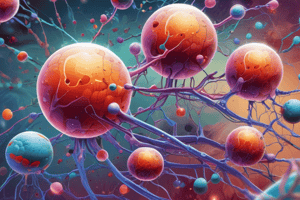Podcast
Questions and Answers
Which form of cell death is characterized by cell shrinkage, nucleus rupture, and disintegration without inflammation?
Which form of cell death is characterized by cell shrinkage, nucleus rupture, and disintegration without inflammation?
- Apoptosis (correct)
- Pyroptosis
- Necrosis
- Autophagy
What are the major executioners in apoptosis?
What are the major executioners in apoptosis?
- Lipases
- Caspases (correct)
- Kinases
- Phosphatases
In which disorders is inhibition of apoptosis observed?
In which disorders is inhibition of apoptosis observed?
- -
- AIDS and neurodegenerative disorders
- Neurodegenerative disorders and inflammatory diseases
- Autoimmune disorders and cancer (correct)
Apoptosis is a form of cell death that causes inflammation.
Apoptosis is a form of cell death that causes inflammation.
Excess apoptosis can lead to neurodegenerative diseases.
Excess apoptosis can lead to neurodegenerative diseases.
Caspases are synthesized as precursors in the cell, and activated during apoptosis to cleave target proteins.
Caspases are synthesized as precursors in the cell, and activated during apoptosis to cleave target proteins.
Apoptosis can be initiated through only one pathway, the extrinsic pathway.
Apoptosis can be initiated through only one pathway, the extrinsic pathway.
Inhibition of apoptosis is observed in cancer, autoimmune disorders, and inflammatory diseases.
Inhibition of apoptosis is observed in cancer, autoimmune disorders, and inflammatory diseases.
Apoptosis can be initiated through both intrinsic and extrinsic pathways
Apoptosis can be initiated through both intrinsic and extrinsic pathways
HIV Tat protein increases the expression of the Fas receptor, resulting in excessive apoptosis of T cells
HIV Tat protein increases the expression of the Fas receptor, resulting in excessive apoptosis of T cells
Both infected and uninfected T cells express Fas, leading to apoptosis when they interact
Both infected and uninfected T cells express Fas, leading to apoptosis when they interact
The activation of death receptors by death ligands plays a major role in the extrinsic pathway of apoptosis
The activation of death receptors by death ligands plays a major role in the extrinsic pathway of apoptosis
Apoptosis is only needed for proper development and not for destroying cells
Apoptosis is only needed for proper development and not for destroying cells
Apoptosis can be induced by increased levels of oxidants within the cell
Apoptosis can be induced by increased levels of oxidants within the cell
There are three types of caspases involved in apoptosis: initiators, effectors, and executioners
There are three types of caspases involved in apoptosis: initiators, effectors, and executioners
Flashcards are hidden until you start studying
Study Notes
-
Apoptosis is a programmed cell death necessary for normal development and homeostasis in multicellular organisms.
-
In humans, about 100,000 cells are produced every second by mitosis, while a similar number die by apoptosis.
-
Apoptosis and necrosis are two different forms of cell death with distinct characteristics.
-
Apoptosis is an energy (ATP)-dependent process where the cell shrinks, the nucleus ruptures, and the cell disintegrates without inflammation.
-
Apoptosis plays crucial roles in various physiological and pathological situations, such as development, immune systems, and wound repair.
-
Excess apoptosis can lead to neurodegenerative diseases, while deficient apoptosis can cause cancer and autoimmunity.
-
Caspases are the major executioners in apoptosis, synthesized as precursors in the cell, and activated during apoptosis to cleave target proteins.
-
Apoptosis can be initiated through various pathways, including the extrinsic pathway, which begins outside the cells, and the intrinsic pathway, which is activated in response to signals from within the cell.
-
Inhibition of apoptosis (decreased apoptosis) is observed in various disorders, including cancer, autoimmune disorders, and inflammatory diseases.
-
Apoptosis is also excessive in certain disorders, such as AIDS, where CD4+ T cells undergo apoptosis due to HIV infection, and in neurodegenerative disorders, where caspases play a role in disease progression.
-
Apoptosis is a programmed cell death necessary for normal development and homeostasis in multicellular organisms.
-
In humans, about 100,000 cells are produced every second by mitosis, while a similar number die by apoptosis.
-
Apoptosis and necrosis are two different forms of cell death with distinct characteristics.
-
Apoptosis is an energy (ATP)-dependent process where the cell shrinks, the nucleus ruptures, and the cell disintegrates without inflammation.
-
Apoptosis plays crucial roles in various physiological and pathological situations, such as development, immune systems, and wound repair.
-
Excess apoptosis can lead to neurodegenerative diseases, while deficient apoptosis can cause cancer and autoimmunity.
-
Caspases are the major executioners in apoptosis, synthesized as precursors in the cell, and activated during apoptosis to cleave target proteins.
-
Apoptosis can be initiated through various pathways, including the extrinsic pathway, which begins outside the cells, and the intrinsic pathway, which is activated in response to signals from within the cell.
-
Inhibition of apoptosis (decreased apoptosis) is observed in various disorders, including cancer, autoimmune disorders, and inflammatory diseases.
-
Apoptosis is also excessive in certain disorders, such as AIDS, where CD4+ T cells undergo apoptosis due to HIV infection, and in neurodegenerative disorders, where caspases play a role in disease progression.
Studying That Suits You
Use AI to generate personalized quizzes and flashcards to suit your learning preferences.




